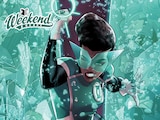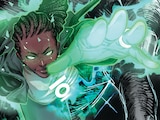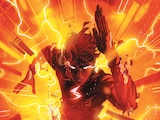I’m not going to bury my lede on this. I firmly believe the answer to the title question is “yes.” In the past few years, Mera has really stepped out of Arthur Curry’s watery shadow. While it’s true she may not have enjoyed the same place in the larger pop culture zeitgeist that characters like Lois Lane and Selina Kyle have held almost from their inception, she’s long been an incredibly powerful metahuman swirling around the larger DC Universe.
How powerful? Well, if for some reason Mera and Arthur were to even throw down to see which one is stronger, Mera would utterly own Aquaman. And when it comes down to which is better suited to rule, I have to say Mera comes out on top there too.

Now, this is my first Ink Spots article, but I’m not new to DCComics.com. If you’re a regular visitor, you might even have read my article about Peter David’s formidable contributions to the Aquaman comic book. Mera is a hugely important character to what I lovingly refer to as “Harpoon-Handed Aquaman.” As Arthur struggles to make sense of his new place in the world as the deposed King of Atlantis and amputee, Mera very much holds down the fort (meaning Atlantis—though maybe they have actual forts there). Arthur, meanwhile, spends much of his time writing in his journal in a pre-Little Mermaid cave of treasure. As Arthur and Mera find their way back to each other, we get a blatant display of Mera’s skills as she defeats her romantic rival for the King’s heart—Dolphin.
But Mera is in no way just an accessory to Arthur’s reign. Far from it! In her earliest origins she was a princess from an alternate underwater dimension. (Dimension Aqua, later named “Xebel,” which then became the city kingdom she is from.) Try to wrap your head around that! This particularly loaded comic book origin really helped to set Mera apart from the other characters who populated Aquaman’s underwater world. Like Arthur, Mera can do things no one else in the Seven Kingdoms of Atlantis can. Arthur can communicate directly with ocean life, but Mera can control water.
That’s right. For all intents and purposes, Mera is a waterbender.

While a whale is the largest, heaviest creature on the planet, and Aquaman could definitely drop one on your head, there’s a little bit of water in everything. Every. Living. Creature. Humans are made of water, plants are made of water, glaciers and frozen tundras are made of water—and Mera has mastery over water. Even taking oceans, seas, rivers, lakes, et al out of the equation, she has a constant arsenal at her disposal. If you’ve seen Aquaman, you know even the desert is not as dry as it may first appear.
In Danielle Paige and Stephen Byrne's Mera: Tidebreaker, the princess’s control of water is an incredible asset to her journey, helps introduce Arthur Curry to his true identity, and gets her in trouble almost from the first page.
I’m not going to go on and on about how powerful water is, but let me make one more point. Just in the interest of proving what a badass Mera is. You know how much harm a human body hitting the surface of water from a great height causes, so now imagine what would happen if a huge quantity of water was suddenly dropped on top of a human body. Or don’t, because it’s not going to be pretty. But you get my point, right? I just want you to comprehend just how powerful Mera is. Talking to fish is cool, and I would love to fling a warrior octopus in my enemy’s face, but if it came to fisticuffs between Arthur and Mera, you have to admit Mera is going to come out on top.

Then there are the subtler character aspects. Mera was raised in Xebel. Unlike Arthur, she was raised as an heir to the throne. In many ways, she’s like Sansa Stark. (Oh yes, we’re all big Game of Thrones fans here in Ink Spots.) Mera understands exactly what it takes to be a diplomat and she has been trained in the ways of politics, intrigue and courtly behavior.
In the DC Bombshells comic series—a series which isn’t technically YA, but that DC Ink fans would probably LOVE—what makes Mera such an asset is her position as ambassador (and agitator), to the land dwellers. For his part, Arthur has none of these qualities. There are some interpretations of Arthur Curry where he assumes the mantle of prince, or king, with grace (here’s looking at you again Mera: Tidebreaker), and there are some where it’s a bit more of a struggle for him (the Aquaman movie, for example). Neither is a less compelling story choice, but both make it obvious that without Mera by his side to explain exactly what is going on at all times, Aquaman would have gotten nowhere as close to the Throne of Atlantis as his birthright may suggest.
Yes, all great partnerships (romantic or otherwise), are about balance. Both Mera and Arthur are at their best when they’re together. However, I truly believe when you add up all the points in their columns, Mera emerges victorious as the candidate most perfectly poised for leadership. In fact, Mera: Tidebreaker explores that very idea.

Fulfilling your destiny and living up to your identity are a cornerstone of young adult fiction—and superhero storytelling. They make up so much of what we love about our modern mythology. Bearing all that in mind, I contend that not only is Mera a more impressive metahuman than Aquaman, but she is the best candidate we’ve been presented with to be leading the Kingdom of Atlantis and the Six Kingdoms it shares the oceans with.
Mera: Tidebreaker by Danielle Paige and Stephen Byrne is now available in bookstores, comic shops and as a digital graphic novel.
When not expressing her love for Robin and the Teen Titans, Ashley V. Robinson can be found writing about TV here on DCComics.com as part of the Couch Club and giving Geek History Lessons on the Jawiin YouTube channel. You can follow her on Twitter at @AshleyVRobinson.




















